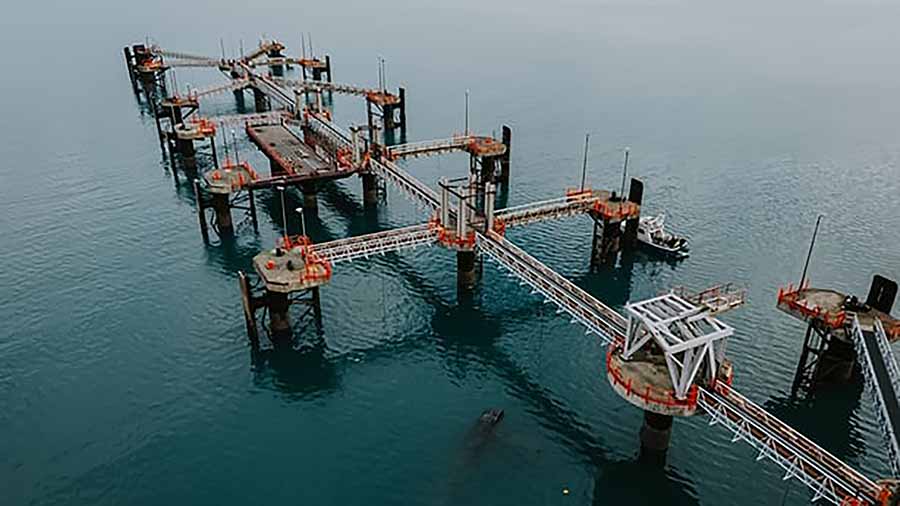
Irish Continental Group plc (ICG), the leading Irish-based maritime transport operator, has reported a strong performance for the first half of 2025, with pre-tax profits surging 40.4 per cent to €20.5 million, up from €14.6 million in the same period last year.
The company, which owns Irish Ferries and operates key routes across the Irish Sea and beyond, attributed the gains to strategic fleet investments and resilient demand for its services, despite ongoing challenges from the lingering effects of the Holyhead port closure. Revenues climbed 8.5 per cent to €309.9 million, reflecting growth in both passenger and freight segments, while the board declared an interim dividend of 5.37 cent per share, a 5.1 per cent increase on the previous year’s 5.11 cent.
In a statement accompanying the half-year report, ICG chairman John B. McGuckian highlighted the period’s successes, noting that the group had navigated a “difficult start” effectively. Total passenger carryings reached 1,284,500, marking a 3.5 per cent decline from the prior year, primarily due to reduced sailings on the Dover-Calais route and disruptions at Holyhead port in north Wales.
The port’s closure, triggered by severe storm damage in December 2024, forced a partial reopening in mid-January 2025 and continued to impose operational restrictions through September and October, with full services not expected until early 2026. This event, described by McGuckian as having a “serious impact” on customers during a peak trading season, led to a 4.4 per cent drop in car carryings to 264,900 units. Freight volumes, however, proved more resilient, with roll-on/roll-off (RoRo) units up 2.2 per cent year-on-year, bolstered by enhanced capacity from recent vessel additions.
Despite the setbacks, passenger revenues rose 8.6 per cent to €84.5 million, underscoring the premium appeal of Irish Ferries’ modern fleet and onboard amenities. The company’s container and terminal division also shone, with containers shipped jumping 24.7 per cent and port lifts increasing 10 per cent, driven by a space-sharing agreement with rival P&O Ferries on the Dover-Calais route. Overall, the ferries division’s operating profit climbed 41.4 per cent to €24.6 million, while EBITDA in the segment improved amid higher volumes and cost efficiencies.
A key driver of ICG’s growth has been its deliberate expansion beyond the traditional Irish Sea routes, which have long formed the backbone of its operations linking Ireland with Britain. Historically focused on the Dublin-Holyhead and Rosslare-Pembroke crossings, Irish Ferries has augmented its network by strengthening continental connections from England, particularly the Dover-Calais service launched in 2021.
This short-sea route, now served by vessels including the Isle of Inishmore and Isle of Innisfree, has become a cornerstone of diversification, offering seamless access to mainland Europe and capturing a slice of the world’s busiest ferry market. McGuckian emphasised that these English continental routes “enhance our customer offering and increase capacity,” allowing the group to tap into broader European trade flows and tourism.
The addition of the Oscar Wilde in June 2024, a former P&O vessel now under a two-year charter with purchase option, has further boosted freight capacity by up to 20 per cent on Dover-Calais, while the recent acquisition of the James Joyce – the largest and fastest cruise ferry on the Irish Sea with space for over 2,000 passengers – has enabled daily sailings on the Dublin-Cherbourg route. These moves have eliminated the need for external chartering of passenger ships, marking a “significant step forward” in fleet ownership and operational control.
The Holyhead closure, which extended into mid-January 2025 after Storm Darragh battered the Welsh port’s infrastructure, amplified the strategic value of these continental expansions. Handling around 60 per cent of Ireland-Wales freight before the incident, Holyhead’s downtime disrupted thousands of lorries and passengers, forcing diversions to alternative ports like Pembroke and Fishguard. ICG responded swiftly by redeploying vessels, including introducing temporary Dublin-Pembroke and Dublin-Fishguard services, which minimised losses but still shaved volumes in early 2025.
The incident “highlighted the risks of over-reliance on a single route,” praising ICG’s proactive fleet adjustments. Repairs at Holyhead, overseen by port operator Stena Line, remain ongoing, with further restrictions anticipated into 2026, potentially costing the wider Irish Sea trade €2 billion in delayed goods. Yet, McGuckian expressed optimism, stating that post-reopening volumes have normalised, with RoRo carryings rebounding strongly.
Sustainability efforts also featured prominently in the results, with two vessels – the Dublin Swift and Isle of Inisheer – transitioning to hydrotreated vegetable oil (HVO) fuel, which can cut emissions by up to 80 per cent compared to conventional marine fuels. This aligns with ICG’s broader commitment to EU emission trading system compliance and net-zero goals by 2050, amid rising regulatory pressures like the upcoming FuelEU maritime regulation. The group also acquired the CT Endeavour container ship in April, bolstering its Eucon subsidiary’s operations between Ireland and the continent.
Looking ahead, ICG upgraded its full-year EBITDA forecast to €145 million, up from earlier estimates of €142.5-143.1 million, citing continued volume recovery and the benefits of its expanded route network. Shares in the company rose 0.7 per cent in early Dublin trading following the announcement, reflecting investor confidence in its pivot towards continental Europe. As Ireland’s trade with England and continent grows – with freight volumes hitting record highs of 767,200 units in 2024 – ICG’s strategy positions it to capitalise on post-Brexit opportunities and resilient demand, even as geopolitical and weather-related risks persist.




